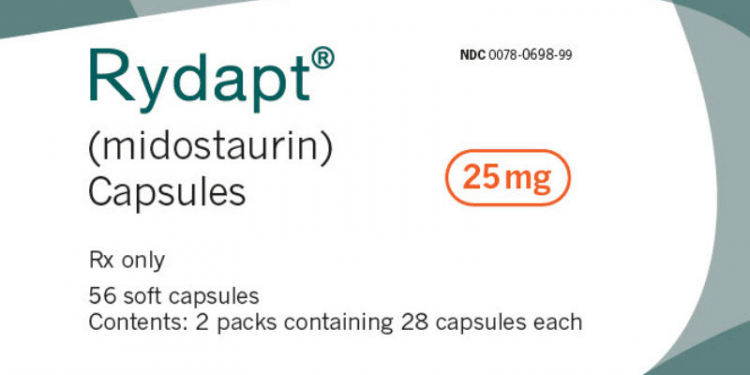The FINANCIAL — Novartis on July 21 announced that the European Medicines Agency’s (EMA) Committee for Medicinal Products for Human Use (CHMP) adopted a positive opinion recommending approval of Rydapt (midostaurin) for the treatment of adults with newly diagnosed acute myeloid leukemia (AML) who are FLT3 mutation-positive.
If approved by the European Commission (EC), Rydapt will be indicated in combination with standard daunorubicin and cytarabine induction and high-dose cytarabine consolidation chemotherapy, and for patients in complete response, followed by Rydapt single agent maintenance therapy, for adult patients with newly diagnosed AML who are FLT3 mutation-positive. Rydapt was also recommended for approval as monotherapy for the treatment of adult patients with aggressive systemic mastocytosis (ASM), systemic mastocytosis with associated hematological neoplasm (SM-AHN) or mast cell leukemia, according to Novartis.
If approved, Rydapt will be the first targeted treatment available in the European Union (EU) for newly diagnosed FLT3 mutation-positive AML patients and advanced systemic mastocytosis (SM) patients. The opinion follows the recent US Food and Drug Administration (FDA) 2017 approval of Rydapt for FLT3-mutated AML and advanced SM on April 28 and the Swissmedic approval on May 4.
“Novartis is dedicated to bringing new treatment options to patients with rare diseases, including AML and advanced SM, which have seen limited treatment developments in the past 25 years,” said Bruno Strigini, CEO, Novartis Oncology. “We are pleased with the positive recommendation from the CHMP and excited to move a step closer to bringing this much-needed treatment to these patients across Europe.”
AML is a rare and aggressive cancer of the blood and bone marrow. In the EU, there are over 18,000 estimated new cases of AML each year. Approximately one-third of AML patients will have a FLT3 gene mutation.
FMS-like tyrosine kinase 3 (FLT3) is a type of cell-surface receptor which plays a role in increasing the number of certain blood cells and the FLT3 gene mutation can result in faster disease progression, higher relapse rates and lower rates of survival than other forms of AML. Prior to the approval of Rydapt in the US, the AML therapeutic strategy had remained relatively unchanged for more than 25 years.
Advanced SM is a rare blood disorder characterized by uncontrolled growth and accumulation of mast cells – mediators of allergic responses – in one or more organs. In advanced SM, mast cells accumulate in such high quantities that they begin to cause organ damage. Median overall survival is currently less than six months for mast cell leukemia, two years for SM-AHN and 3.5 years for ASM.
The EC typically adheres to the recommendation of the CHMP and delivers its final decision within approximately two to three months. The decision will be applicable to all 28 EU member states, plus Iceland, Liechtenstein and Norway.
The positive opinion is based on the Phase III RATIFY (CALGB 10603 [Alliance]) clinical trial, which was conducted in collaboration with the Alliance for Clinical Trials in Oncology and 13 international cooperative groups. In the trial, newly diagnosed FLT3 mutation-positive patients who received Rydapt plus standard chemotherapy experienced significant improvement in overall survival with a 23% reduction in the risk of death compared with placebo plus standard chemotherapy, with median overall survival of 74.7 months and 25.6 months, respectively (hazard ratio [HR] = 0.77, 95% CI, 0.63, 0.95; one-sided p=0.0078)1. The full data from the RATIFY trial were recently published in the New England Journal of Medicine (NEJM).
Event-free survival (EFS; event defined as no complete remission within 60 days of the start of induction therapy, relapse or death) was significantly longer for Rydapt plus chemotherapy versus placebo plus standard chemotherapy (median of 8.2 months compared to 3.0 months, HR = 0.78, 95% CI 0.66, 0.93 and one-sided p=0.0024). RATIFY is the largest worldwide clinical trial in newly diagnosed FLT3-mutated AML to date, as 3,277 AML patients were screened for the FLT3 mutation and 717 patients were enrolled.
In the Phase III AML RATIFY trial, the most frequent adverse reactions (incidence greater than or equal to 30%) in the Rydapt plus standard chemotherapy arm were febrile neutropenia, nausea, exfoliative dermatitis, vomiting, headache, petechiae (small red skin spots) and pyrexia. The most frequent non-hematologic Grade 3/4 adverse reaction was febrile neutropenia.
The recommendation in advanced SM is based on two single-arm open-label multicenter trials, including the Phase II study (CPKC412D2201), which was the largest prospective trial ever conducted in this rare disorder. The efficacy of Rydapt was established using modified Valent criteria, with patients demonstrating an overall response rate, defined as a major or partial response, of 59.6% (95% confidence interval [CI], 48.6, 69.8%). Efficacy was also assessed in a post-hoc analysis using the 2013 International Working Group-Myeloproliferative Neoplasms Research and Treatment-European Competence Network on Mastocytosis (IWG-MRT-ECNM) consensus criteria (n=113). This assessment estimated an overall response rate of 28.3% (95% CI, 20.2, 37.6).
In advanced SM, the most frequent adverse reactions were nausea, vomiting, diarrhea, peripheral edema and fatigue. The most frequent Grade 3/4 adverse reactions were fatigue, sepsis, pneumonia, febrile neutropenia and diarrhea.
Rydapt Ongoing Clinical Development
In order to further investigate the potential of Rydapt in AML, Novartis is planning a Phase III study in newly diagnosed AML patients without a FLT3 mutation (wildtype).






























Discussion about this post